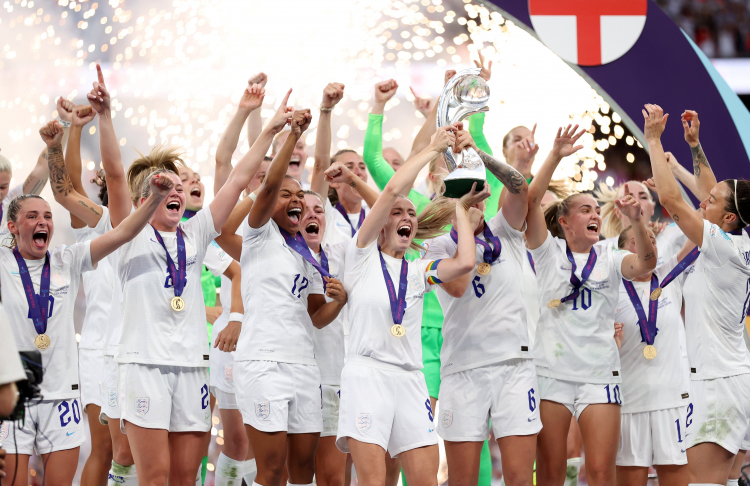It’s Time to Give Women Footballers Their Due

Let’s face it, when we think of football players, we think of men. That isn’t to say that women's football doesn’t have a rich and lucrative past. As early as 1920, you could join a crowd of thousands to watch Dick, Kerr Ladies FC, a women's team spun out of a World War One manufacturing plant, beat the French in the first women’s Football Association match in history.
Soon after, the Football Association imposed a long-lasting ban on women’s football, branding the sport as ‘quite unsuitable for females’. This offers some explanation as to why the legacy of women’s football has been so overlooked. But even with female players legally back on the pitch today, they remain trivialized or flat out ignored. Amidst a renaissance of women’s football, our media must do a better job.
Image Credit: Wikimedia CommonsFast forward to July 2022, and The Lionesses, England’s Women's football team beat Germany in the Euros final, the nation’s first major trophy since 1966. The single match pulled a whopping 17.6 million viewership and triggered a long overdue conversation about the media's unequal treatment of women's teams.
The Lionesses’ Euros campaign is large-scale proof of a substantial and willing audience, but on the ground, small, local teams are also putting in the work to boost the profile of women’s football and to carve out inclusive spaces for those often sidelined from the beautiful game.
Rose Norris is a football fan and team member of Shepherds Booters FC, a London based football club for women and non-binary people. She “joined the team [for] a safe and inclusive space to play a sport I love”; going from strength to strength and even being dubbed a ‘grassroots club to watch’ by the Evening Standard.
Such mainstream coverage affirms a resurgence of public interest in women's football. Nonetheless, with the regular league off TV at the time of the Lionesses victory, Nish Uddin, another member of Shepherds Booters, is “interested to see how the media would have divided up attention" had tournaments been running concurrently.
There is a glaring inequality in how outlets broadcast mens and womens sports. One University study found that 95% of total sports television coverage focused on men’s fixtures in 2019. The study’s co-author, Cheryl Cooky, cites this ‘missing piece’ of media coverage as the real blockade to audience growth and interest in women's sport.
In the UK, Rose says “we definitely have a long way to go”. “We are taught from a young age that football isn’t a girls’ game, which up until now was reflected by social and commercial media.” The lack of coverage of women’s sport is one hurdle to changing perceptions about the value of women's football. A larger one, perhaps, is the nature of that coverage when it happens.
A piece by FEMAIL, (the ‘women’s segment’ of the Daily Mail), that profiled the Lionesses in August 2022 is one such example. Littered with condescending captions unrelated to the player’s abilities, we are told that left-back Alex Greenwood is ‘very big into her heels, her dresses and her eyelashes' and that center-forward Chloe Kelly has been with her boyfriend for 3 years.
Image Credit: Instagram/@chloekellyAt best, it's a patronizing suggestion that the Lionesses are ‘girls just like us!’ It coaxes us into thinking: why should I care about anything beyond their relationship status, where they holiday, if they spray tan? At worst, it shows that discourse around female athletes remains stuck in two archaic tropes. One, that women are fundamentally frivolous, and two, that their real value is off the pitch as loving daughters, girlfriends, and wives.
Despite this, I do believe we are at a cultural turning point. The Euros final viewership is a beacon of hope, but it’s just the tip of the iceberg. High viewing figures don’t eradicate pay disparities between men's and women's teams, or the fact the Lionesses took home €16 million, a dwarf sum compared to the men's Euros prize pot of €331 million.
Financial backing is crucial to rewriting the narrative. Looking ahead, Rose says “if we were to see more money and time go into creating safe spaces for women to play football everywhere […] the likelihood of achieving equal respect for female athletes is higher.” Like Dick, Kerr Ladies before them, Shepherds Booters are leveling the playing field by boosting the visibility of women’s football from the ground up.
We must ensure that this is not a passing fad, we must demand more from our mainstream media. To be it, we have to see it, and to see it meaningfully, we must keep watching with a critical eye.









